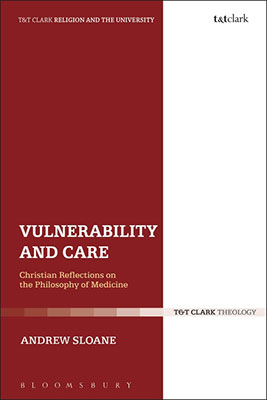Vulnerability and Care: Christian Reflections on the Philosophy of Medicine
Andrew Sloane, T and T Clark, 2016, 211pp, hbk, £84.99
I have recently seen at close hand the work a busy acute hospital having to deal with an older person suffering multiple challenges to well-being caused in the main by intense confusion as a result of the Alzheimer’s disease. The result was shocking and frustrating. Although, of course, a one-off situation which was intensified by my own sense of powerlessness and my personal pain at the way this person was treated – I suspect that this experience is not uncommon and may well be replicated across the National Health Service. We keep on being told that the NHS is in crisis principally for financial reasons but the central organizing question this book suggests that there challenges are also moral : it asks is how we care for vulnerable people in such a way as to deepen compassion and alleviate suffering.
For this reader the book came at the right time. It offers wisdom and a wider theological view. Andrew Sloane deserves gratitude and praise for a powerful narrative that asked this question: can the focus of modern medicine change? The implication is that if it does not its very soul is in jeopardy. In the light of my own experience the reader will understand why this plea resonated so deeply and profoundly in my soul.
To return to the anecdotal – I remember during my time teaching at the Birmingham University medical school exploring with groups of students how far their ethical teaching and curriculum help them make decisions. Since those teaching days a great deal of attention has been given to public and academic debate about medical and bioethical issues. Those groups of students and young doctors taught me that they relied as much on intuition (I need to respond quickly and so do what I feel is right) as much as the body of knowledge classified as medical ethics. Sloane takes one step back from the issue of the relationship between theory and practice and asks his reader to explore the nature of medicine and its role in human community.
The nine chapters seek to put theology to work by offering a framework of Christian philosophical and theological thinking which might enable us to understand the nature and purposes of medicine and its role in a Christian understanding of human society.
So what does the book do?
First it presents a description of the contexts in which medicine is practiced in the early 21st century, identifying key problems and challenges that medicine must address. It then turns to issues in contemporary bioethics, demonstrating how the debate is rooted in conflicting visions of the nature of medicine (and so human existence). This leads to a discussion of some of the philosophical and theological resources currently available for those who would reflect ‘Christianly’ on medicine.
The core of the text attempts to articulate a Christian view of medicine as a moral practice which might be shaped by a Christian social vision and a number of key theological commitments.
The book concludes with some powerful pedagogical reflections (pp 178 ff ). First Sloane asks that if it is the case that medicine is an expression of community solidarity with those whose vulnerability is exposed and if its goal is to express appropriate forms of care for the frail then we should rethink how we train doctors. In terms of medical epistemology, the internal goods of medicine and their relationship to other goals always threaten to distort or corrupt the practice of medicine. And in this we all need to take responsibility in relation to our wildly unrealistic expectations about what medicine can deliver.
A final theme, and possibly to be developed in his future writing lies, in the embodied nature of medicine. If we are ‘knowing bodies’ then doctors in partnership with their patients need to understand what is going on in the body: to listen carefully to the story of our bodies as to discern both what matters and how we might embrace frailty and nurture wholeness. The undue focus on investigations, the obsession with tasks and performance both detract from the human element of the clinical encounter and (in Sloane’s view) wrongly understand the nature and goals of medical knowledge. This reflects an ongoing interest in a number of public bodies in the UK concerning the medical humanities and how these might be built into a more holistic approach of nurturing both medicine and the medical profession. Medical paternalism and powerful self protecting professionalism needs to be challenged if the world of medicine is to be re-engaged and transformed. However this will require from us that we reconfigure what medicine can and cannot do for us.
This is a stimulating and enriching book. It is inevitably stronger on theory rather than practice but its call and argument is clear and convincing. It deserves to be picked up and developed by those of us who seek wholeness and all those professional groups that are tasked to care for those in need.
